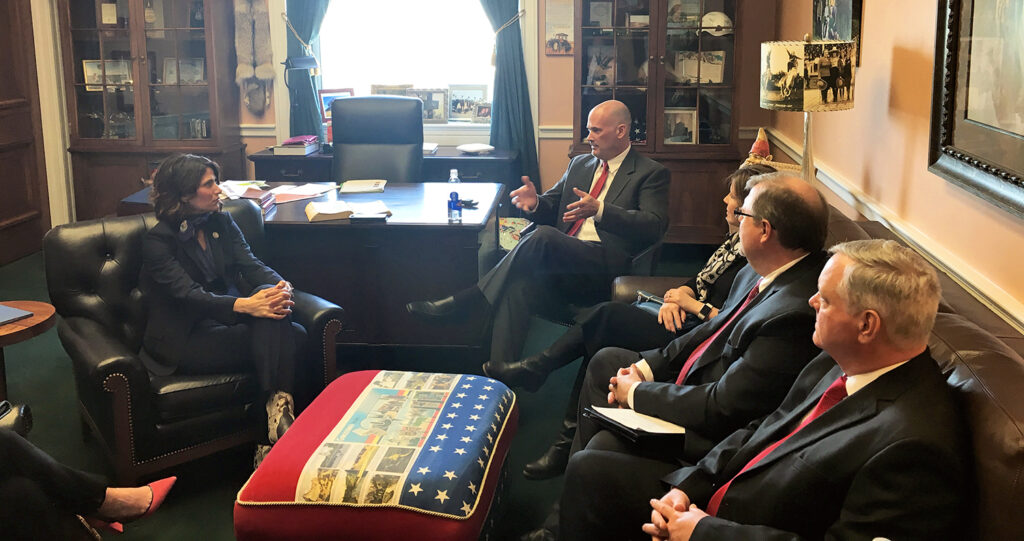CEO’s Report: Advocacy in action
March 3, 2017Former Oklahoma attorney general Scott Pruitt was recently confirmed to lead the Environmental Protection Agency. If you do a quick internet search on Pruitt, coverage focuses on his being “arm in arm” with the industry and friends with “big oil.”
One thing I have realized through the media coverage of Pruitt is that we, as an industry, are not doing a good enough job educating others on public power.
Public power is often referred to as “hometown power” because decisions are made at the local level. Because they’re made locally, decisions are also made with the best interests of citizens in mind, including decisions to ensure reliable power, clean air and affordable prices.
While public power providers, including Heartland, certainly want clean air for our citizens and future generations, we also don’t want our electricity bill to take up the majority of our paychecks.
We conveyed this message to members of Congress at the recent Legislative Rally hosted by the American Public Power Association in Washington, D.C.
About 67% of the electricity generated in the United States in 2015 was from fossil fuels, according to the U.S. Energy Information Administration.

That means the majority of Americans are using electricity generated by fossil fuels, including coal and natural gas. This includes customers of Heartland.
I think the distinction needs to be made that when regulations are imposed at the federal level, they aren’t just hurting the pocketbooks of those who stand to profit from the sale of fossil fuels. They’re hurting the pocketbooks of businesses and residents in the Midwest.
They’re hurting our customers who rely on coal generation to power their homes and businesses.
While meeting with Representative Kristi Noem (R – S.D.), she made an interesting point about South Dakotans spending a large portion of their income on energy, pointing out that it’s cold in the winter, hot in the summer and we have to drive long distances to get places.
I decided to dig a little deeper on the matter to see where some of our customers fall in that sphere. According to the U.S. Energy Information Administration, Iowa ranks 6th in total energy expenditures per capita at $5,796. South Dakota is not far behind, ranking 8th at $5,648. Nebraska comes in 9th at $5,486 with Minnesota 22nd at $4,638.
Looking at total energy consumed per capita, Iowa ranks 5th, Nebraska and South Dakota are tied for 7th and Minnesota is 18th.
Those rankings include all energy, not just electricity, but it still worth noting the respective rankings when it comes to the average retail price of electricity to the residential sector. Kansas falls 18th on the list, Minnesota 19th, Iowa 26th and South Dakota 30th.
When we are spending a larger portion of our income on energy, regulations imposed have an even bigger impact. Fortunately those we met with in D.C. seemed sensitive to this fact. However, I think it is worthwhile to remind them often.
As public power providers, we are not concerned about the pocketbooks of our investors, because we don’t have any. We are concerned about rural Americans.
We’re also concerned about clean air, and have taken incremental steps to ensure our generation assets are as efficient and clean as possible. We will continue to do so, but in a manner that is affordable for those using the electricity generated.
Our other message to Congress was that of the importance of local control, particularly when it comes to distributed generation and the price utilities must pay to customers operating distributed generation resources.
Rate design must take into account a utility’s technical limitations and geographic considerations. Rate design and standards for distributed generation must be regulated locally, rather than federally.
We will soon be launching a new page on our website dedicated to public power with facts you can use for promotion in your community. We will be sending out an email in the next few weeks directing you to this new page. I would encourage everyone to take time to review it and learn how you can help spread the message of public power as hometown power.
We will also include ongoing legislative issues to keep you informed on the latest issues facing our industry.
